THE RIGHT TO THE RADICAL CITY: PUBLIC HISTORY AND REVOLUTIONARY POLITICS IN PRE-


PANELISTS:
Dr. Joan Flores-Villalobos, University of Southern California
Dr. Ian Shin, University of Michigan
Matthew Randolph, Ph.D. candidate in history, Stanford University
STUDENT PRESENTERS:
Thomas Brodey
Joseph Fattorusso
Ethan Fine
Ilyssa Forman-Roberts
Meenakshi Jani
Jiajia Zhang
Date: Friday, April 29
Time: 3:00p.m. to 5:00 p.m.
Location: Pruyne Lecture Hall (Fayerweather 115, wheelchair accessible)
Open and free to all Amherst College staff, faculty and students.
K-95 masks currently required for all indoor events over 10 participants.
At this panel event, three of our distinguished alumni - professional historians - will comment on the work produced by our students, and place it in the larger framework of discussions in the field
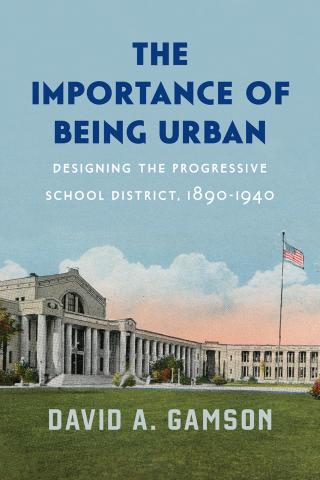
February 18
4:30 p.m.
Paino Lecture Hall (107 Beneski)
Despite the bleak view that many Americans have of our nation’s urban school districts, the Progressive Era city school system was once considered to be among the great democratic creations of the twentieth century. From the 1890s until the Second World War, most prominent educational leaders and policy makers depicted urban schools as laboratories of progressive educational innovation, much in the same way that municipal reformers of the era portrayed cities as experimental stations for novel forms of governance. The enduringly dour view of the American school district—whether accurate or not—masks a fascinating story about the role that school districts have played in the nation’s educational history. Because it offered public education to children from a spectrum of social backgrounds and economic classes, reformers believed that the urban school district held the potential to deliver on the promise of equal educational opportunity by quelling class differences and fostering a tranquil industrial democracy. This talk, adapted from The Importance of Being Urban, looks anew at this Progressive Era institution, exploring why civic leaders, academics, muckraking journalists, educators, and administrators all agreed on the urgency of urban educational reform and why they believed that the newly designed progressive school district was singularly qualified to carry out comprehensive educational improvement.
Read more about Professor Gamson's work here.

February 19, 2020
4:30 p.m.
Fayerweather 115
Professor Heather Stur will offer a lecture based on her forthcoming book Saigon at War: South Vietnam and the Global 1960s. Stur investigates South Vietnamese political activism during the Vietnam War and focuses on a wide range of actors including South Vietnamese students, Catholics, anticommunists, peace activists, journalists, and diplomats. Her groundbreaking work aims to incorporate South Vietnamese voices, so often overlooked by US historians, more fully into the Vietnam War narrative.
Read more about Professor Stur's work here.

March 23, 2020
4:30 p.m.
Fayerweather 115
Professor McPherson's lecture is based on his new book about the 1976 car bombing of Chilean exile Orlando Letelier and his US colleague, Ronni Moffitt, in the heart of the US capital. The crime sparked an international investigation, a diplomatic impasse, and several courtroom dramas, all shaping one of the most consequential political thrillers of our time. The Letelier assassination changed the history of human rights, democracy and counterterrorism, and helped end Chile’s murderous dictatorship.
Thursday, December 6
4 p.m.
Kirkpatrick Hall (Science Center room A011)
Governments and journalists tell us that though Chernobyl was “the worst nuclear disaster in history,” a reassuringly small number of people died (44), and nature recovered. Yet, drawing on a decade of fine-grained archival research and interviews in Ukraine, Russia, and Belarus, this talk uncovers a much more disturbing story—one in which radioactive isotypes caused hundreds of thousands of casualties. Scores of Soviet scientists, bureaucrats, and civilians documented stunning increases in cases of birth defects, child mortality, cancers, and a multitude of prosaic diseases, which they linked to Chernobyl. Worried that this evidence would blow the lid on the effects of massive radiation release from weapons testing during the Cold War, international scientists and diplomats tried to bury or discredit it. A haunting revelation of how political exigencies shape responses to disaster, Manual for Survival makes clear the irreversible impact on every living thing not just from Chernobyl, but from eight decades of radiation from nuclear energy and weaponry.
Kate Brown is a Professor of History at the University of Maryland, Baltimore County. She is the author of A Biography of No Place: From Ethnic Borderland to Soviet Heartland (Harvard 2004); Plutopia: Nuclear Families in Atomic Cities and the Great Soviet and American Plutonium Disasters (Oxford, 2013); Dispatches from Dystopia: Histories of Places Not Yet Forgotten (Chicago, 2015); andManual of Survival: A Chernobyl Guide to the Future (Norton, 2019). Her work has received numerous prizes and awards, including from the American Society for Environmental History, the Organization of American Historians, and the American Historical Association. In 2016, she received the prestigious Carnegie Foundation Fellowship.
Tuesday, November 27
4:30-6:30 p.m.
Frost Library, 210
Panelists:
Discussant:
In the contemporary political pathology, two phenomena appear currently intertwined, exclusionary nativist beliefs and electoral preferences for illiberal styles of politics. Do we witness a global return to a longing for closed ethnic communities and authoritarian rulers, promising security in an age of perceived systematic crises? Whereas the rapid rise of the populist radical right in Europe as much as in the US is an evident starting point, the aim of the panel is also to open up the conversation to a larger outlook. How can we explain these global reactions upon geopolitical developments as much as the globalization of uncertainty? These issues will be addressed by the four panelists followed by a discussion in plenum.
Dr. Tamir Bar-On is one of world’s leading experts on the French and European New Right. He is a professor in the School of Social Sciences and Government, Tecnológico de Monterrey in Queretaro, Mexico.
Chip Berlet is a Boston-based American investigative journalist, research analyst, photojournalist, scholar and activist, specializing in the study of extreme right-wing movements in the US and the dissemination of conspiracy theories.
Dr. Dwaipayan Sen is an expert on the history of caste policy and postcolonial democratization in India. He is an Assistant Professor of Asian Languages and Civilizations and History at Amherst College.
Dr. Maria Alexandrovna Sidorkina is a postdoctoral fellow at the Centre for Humanistic Inquiry at Amherst College. Her research concerns illiberal publics and politics in post-socialist space, linguistic anthropology and digital sociability.
Dr. Andreas Önnerfors is Associate Professor in Intellectual History at the University of Gothenburg, Sweden, currently specializing in contemporary European New Right populist rhetoric.
Monday, February 5
4:30 p.m.
Paino Lecture Hall, Beneski
Enrico Fermi was one of the most significant figures of 20th century physics, with major contributions across a wide range of sub-disciplines. He was also a central figure in the Manhattan Project, and led the team that created the first controlled, sustained nuclear chain reaction at the University of Chicago in December 1942. How did Fermi become Fermi? Drawing on research undertaken in preparation for his new biography of Fermi, “The Last Man Who Knew Everything: The Life and Times of
Enrico Fermi, Father of the Nuclear Age” (Basic Books), David N. Schwartz will discuss the development of Fermi as a physicist; the role of nature, nurture, and historical circumstance in his career; and the characteristics behind both his strengths and his weaknesses. Are great physicists born, do they make themselves, or do others make them? How does the accident of one’s birth influence a career like Fermi’s? What was it that enabled Fermi to continue to contribute to the field well beyond the age when many great physicists are content to rest on their previous achievements?
David N. Schwartz holds a B.A. from Stanford University and a Ph.D. from the Massachusetts Institute of Technology. He has worked at the US Department of State, the Brookings Institution, and Goldman Sachs in both London and New York. He has published widely on US strategic nuclear weapons policy, NATO, and foreign policy. He lives in New York with his wife Susan. His father, Melvin Schwartz, shared the 1988 Nobel Prize in Physics for the discovery of the muon neutrino.

Tuesday, January 30
6:00 p.m.
Pruyne Lecture Hall, Fayerweather
Intellectual and cultural historian Steven E. Aschheim (Hebrew University, Jerusalem) is the author of Brothers and Strangers: The East European Jew in German and German Jewish Consciousness, 1800-1923 (1982), The Nietzsche Legacy in Germany 1890-1990(1993), Culture and Catastrophe: German and Jewish Confrontations With National Socialism and Other Crises (1996), In Times of Crisis: Essays on European Culture, Germans, and Jews (2000), Scholem, Arendt, Klemperer: Intimate Chronicles in Turbulent Times(2001), Beyond the Border: The German-Jewish Legacy Abroad (2007), and At the Edges of Liberalism: Junctions of European, German, and Jewish History (2012).
In his lecture, The Dialectic of Enlightenment Revisited, Aschheim will critically interrogate Adorno and Horkheimer's 1944 much admired "Dialectic of Enlightenment", addressing its contextual and ideological origins, its philosophical biases and theoretical assumptions, and the nature of its emphases and omissions as the work sought to grasp the barbarism of the time. He will also highlight a rather overlooked publication detail which ideally should have given the authors pause to somewhat revise their provocative views and positions, but in practice did not.
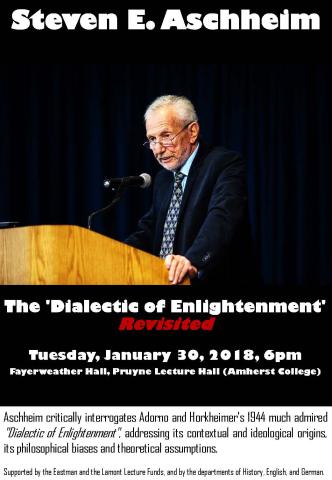
“The Approaching Past: Legacies of Slavery and Conquest on Campus”

Craig Steven Wilder
Barton L Weller Professor of History
Massachusetts Institute of Technology
Thursday, October 5
4:30 p.m.
Paino Lecture Hall
107 Beneski
Professor Wilder will be speaking to contemporary efforts of colleges and universities to confront historical relationships to slavery and colonialism. His most recent book is the award-winning Ebony & Ivy: Race, Slavery, and the Troubled History of America’s Universities (New York: Bloomsbury, 2013). He is also the author A Covenant with Color: Race and Social Power in Brooklyn (New York: Columbia University Press, 2000/2001) and In the Company of Black Men: The African Influence on African American Culture in New York City (New York: New York University Press, 2001/2004). His talk will examine how we arrived at this moment and how to address the challenges that remain. (MIT’s full profile).
The annual Hugh Hawkins Lecture honors Hugh D. Hawkins. Professor Hawkins was the Anson D. Moore Professor of History and American Studies upon his retirement from the faculty in 2000 after forty-three years of teaching at Amherst. He was a distinguished scholar of American higher education, the American South, and of cultural and intellectual history. In 1976 he was the principal architect of the first-year introduction to Liberal Studies curriculum and he helped build both the History and American Studies departments.
This lecture is free and open to the public.
Event Flyer:
Thursday, September 15
Halsted Lounge Celebration (Chapin 19): 3:00 – 4:00 p.m.
Fall Majors Meeting (Chapin 101): 4:00 – 5:00 p.m.
Thursday, September 15th brings History's Fall Majors meeting, where we review major requirements and department deadlines. Prior to the meeting, however, we'd like to invite everyone to celebrate our newly renovated Halsted Lounge, Chapin 19. In consultation with History alums Becky Konijnenberg '16 and Matt Randolph '16, the History department has renovated the lounge to make it a much friendlier study and social space for our majors. Please come celebrate (and eat) with us!
Wednesday, September 21
4:30 p.m.
Center for Humanistic Inquiry (CHI), Frost Libary
Steven Simon is John J. McCloy ’16 Visiting Professor of History at Amherst College. Professor Simon has held a variety of positions in the U.S. State Department and in academe as a Middle Eastern policy advisor, consultant, and scholar; he is also widely published as both national commentator and book author. He is a former director of the U.S. and Middle East offices of the International Institute for Strategic Studies and a former senior director for Middle Eastern and North African Affairs on the White House’s National Security Council. He is currently working on a new book, entitled The Long Goodbye: The U.S. and Middle East from the Islamic Revolution to the Arab Spring. The History Department is delighted to welcome Steven Simon to Amherst.
“Worlds Apart: The Cold War in the 20th Century”
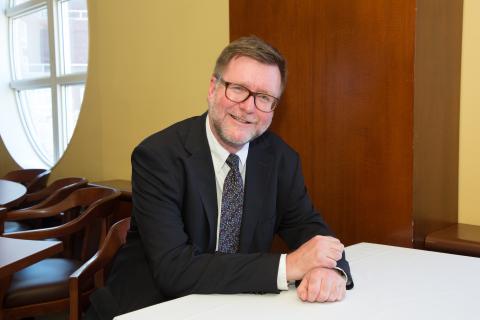
Arne Westad
S.T. Lee Professor of U.S.-Asia Relations
Ash Center for Democratic Governance and Innovation
John F. Kennedy School of Government
Harvard University
Thursday, September 29, 2016
4:30 p.m.
Paino Lecture Hall (107 Beneski Hall)
The Department of History is delighted to welcome Professor Arne Westad to Amherst for our 14th annual Hugh Hawkins lecture. Professor Westad "won the Bancroft Prize for The Global Cold War: Third World Interventions and the Making of Our Times. The book, which has been translated into fifteen languages, also won a number of other awards. Westad served as general editor for the three-volume Cambridge History of the Cold War and is the author of the Penguin History of the World (now in its 6th edition). His most recent book, Restless Empire: China and the World since 1750, won the Asia Society’s book award for 2013" (Harvard profile).
Abstract: The Cold War dominated world affairs for almost half a century. But its roots go even further back in time and its effects are still felt today. In this lecture, I will discuss my new book on the Cold War, which tells the history of the global conflict from its inception up to the present. It starts with the first worldwide economic crises, the radicalization of the labor movement, and the expansion of the United States and Russia as transcontinental great powers. And its ends with the fall of the Berlin Wall, the collapse of the Soviet Union, and the multiple ways in which the Cold War determined American policy in the 21st century.
The Cold War was uniquely comprehensive, both because it was a total war (though without direct clashes between the Superpowers) and because of its global reach. People everywhere felt they were affected by it. From the slums of Soweto to Hollywood, Hanoi, and Hamburg, young men and women found causes for which they were willing to offer their careers and livelihoods, and sometimes their lives. And the combined intensity of resilient ideologies and nuclear threats created opposing worlds, which operated according to different logics, but were still connected by the fear of war and destruction.
The new book is not just a history of ideological conflict and great power rise and fall. It is also an account of how the Cold War influenced people’s lives and how the conflict created opportunities for some, but death and misery for others. It ranges wide in terms of research, from Germany to Brazil to China and to South Africa, and shows how people’s dreams of one world united helped drive groups and countries apart – how the search for utopia created ceaseless conflict and merciless leaders.
The annual Hugh Hawkins Lecture honors Hugh D. Hawkins. Professor Hawkins was the Anson D. Moore Professor of History and American Studies upon his retirement from the faculty in 2000 after forty-three years of teaching at Amherst. He was a distinguished scholar of American higher education, the American South, and of cultural and intellectual history. In 1976 he was the principal architect of the first-year introduction to Liberal Studies curriculum and he helped build both the History and American Studies departments.
Event Flyer:
Tuesday, May 3rd – 4:00 p.m.
Multicultural Resource Center (MRC)
What does it mean to be black at Amherst College? Which students identify (or do not identify) as black? What about the black experience at a progressively more diverse Amherst College has changed (or not changed) over time? To what extent have administrative initiatives to promote and celebrate campus diversity succeeded in practically manifesting their promises? Above all, how have students of African descent shaped and been shaped by the character and history of the College?
Curious about these kinds of questions? Uncovering the past has become increasingly critical for Amherst as we approach the College's bicentennial in 2021 and attempt to understand who we were and who we want to be as a community. Come to the Multicultural Resource Center at 4:00pm on 05/03/16 to learn about four seniors' explorations for a special topics course on the history of the black experience at Amherst College with Professors Polk and Couvares. Short presentations will be given by Matt Randolph '16, Amira Lundy-Harris '16, Darienne Madlala '16, and Ajanae Bennett '16. Each presentation will be followed by a Q & A session, with a final dialogue between guests and presenters about future investigation into the topic of black identity at Amherst.
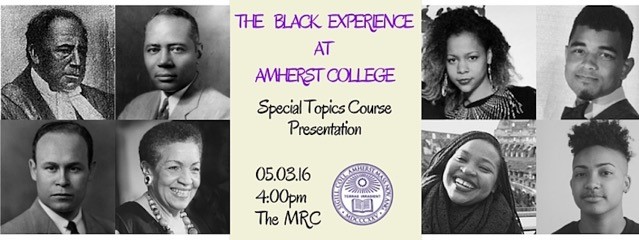
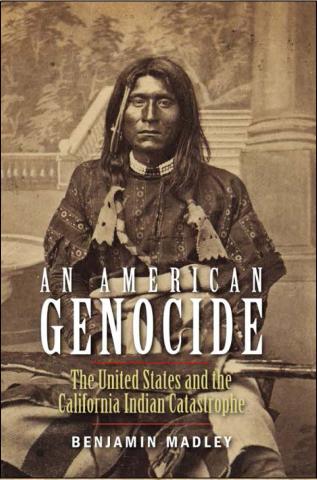
On Friday, April 29th at 4:00 PM in the Friendly Reading Room of Frost Library (Amherst College), Professor Benjamin Madley from UCLA will be talking about his new book, An American Genocide The California Indian Catastrophe (Yale University Press, 2016). Ben's book is a groundbreaking account of an understudied tragedy in U.S. history. As historian Karl Jacoby (Columbia University) has remarked, “Benjamin Madley has changed the conversation on genocide and American Indians. After An American Genocide, it will no longer be possible to debate whether or not genocide took place. Instead, we will need to confront the questions of how and why genocide against American Indians took place and what the United States owes its indigenous communities.”
Dec. 5, 2019
7:00 p.m.: Reception; 7:30 p.m.: Discussion
Cole Assembly Room, Converse Hall
What was it like on September 11, 2001 on Amherst's campus? In New York City? At the Pentagon? How did that day change the United States and the world you grew up in? What does it mean for today and the future? Will this all change as memories fade? Join us for a discussion with three members of the Amherst Community: Frank Couvares, Sandy Genelius, and Mark Jacobson, who will speak about their respective experiences on campus, in New York City, and at the Pentagon on that day.
This event is sponsored by the Amherst College Democrats, the Amherst College Republicans, the Amherst Political Union, and the Amherst Center for Diversity and Student Leadership.
Free and open to the public.
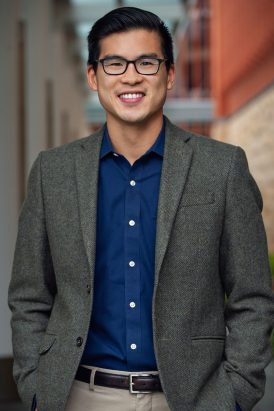
November 14, 2019
4:00 p.m.
Frost Library
Ian Shin is a 2006 graduate of Amherst College. He received his PhD in history from Columbia University in 2016, and he is currently Assistant Professor of American History and Culture at the University of Michigan. Ian will lecture on the book he is completing, Imperfect Knowledge: Chinese Art and American Power in the Transpacific Progressive Era.
Read more about Professor Shin here.
This lecture is free and open to the public.
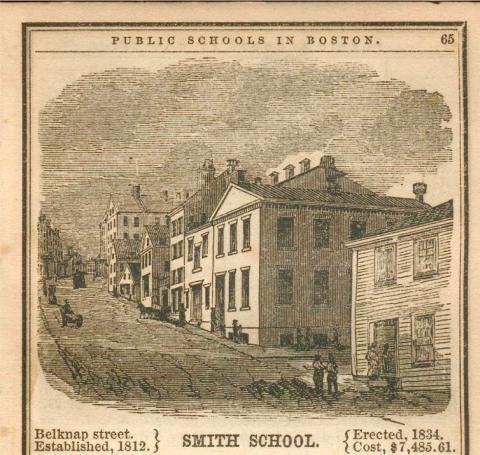
Kabria Baumgartner
Assistant professor of American studies and women's studies at the University of New Hampshire
November 14, 2019
4:30 p.m.
Paino Lecture Hall
107 Beneski
Racial school segregation has been an ongoing national issue, but it dates back to the late eighteenth and early nineteenth centuries. This book talk narrates the half-century struggle to desegregate Boston’s public schools. In the 1840s, the school desegregation campaign hit its stride, as African American activists deployed numerous strategies, from petitions to boycotts to lawsuits like Sarah C. Roberts v. City of Boston. The decision among activists to pursue a case in the name of Sarah, a five‑year‑old black girl, was a conscious one meant to garner public sympathy and legal victory by casting Sarah as an innocent and respectable child in need of protection. Though the Massachusetts Judicial Supreme Court ruled in favor of the Boston school committee, African American activists soon declared victory after the passage of an 1855 state law prohibiting racial discrimination in Massachusetts public schools. Sarah C. Roberts v. City of Boston (1850) was a significant case for a host of reasons, not least of which was the transformation of a black girl into an icon for educational justice.
This event is sponsored by the Sexuality, Women's and Gender Studies, Black Studies, American Studies and History Departments, the Education Studies Initiative, the Eastman Fund, and the Office of Academic Engagement and Student Success. It is free and open to the public.
November 7, 2019
4:30 p.m.
Center for Humanistic Inquiry, Frost Library
Holly Jackson is an associate professor of English at the University of Massachusetts, Boston. Her writing on US cultural history has appeared in The New York Times, The Washington Post, and The Boston Globe.
This lecture is free and open to the public.

October 24, 2019
4:00 p.m.
Frost Library
Christina Thompson will talk about her new book, Sea People: The Puzzle of Polynesia (HarperCollins, 2019). She received her undergraduate degree in English from Dartmouth University and her PhD in English from the University of Melbourne. She is the editor of the Harvard Review.
Find more information about the book here.
This lecture is free and open to the public.

October 29, 2019
4:30 p.m.
Paino Lecture Hall
Jennifer Levi, professor of law at Western New England University, is the director of GLAD's Transgender Rights Project and a nationally recognized expert on transgender legal issues. She will be in conversation with Associate Professor of History Jen Manion.
This lecture is sponsored by the Departments of History and Sexuality, Women and Gender Studies, the Queer Resource Center, and the Lamont Lecture Fund. It is free and open to the public.
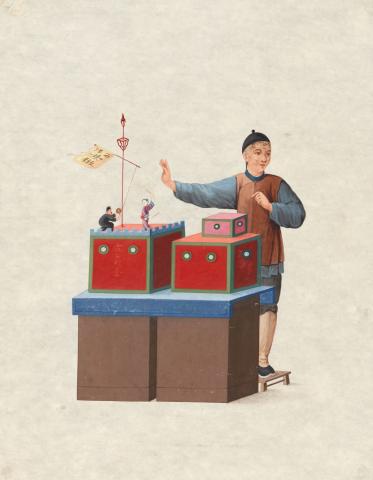
Kristina Kleutghen
Washington University in St. Louis
October 17, 2019
4:30 p.m.
113 Fayerweather
When European optical devices were first introduced into early modern East Asia, these devices affected not only viewing experiences and ideas about vision, but also the production of art. In contrast to the well-established effects on Japanese art, the Chinese case has barely been explored, not least because the science of optics did not develop significantly there prior to the mid-nineteenth century. Yet from the seventeenth century onward, Qing domestic production and use of optical devices resulted in significant relationships with art at the imperial, elite, and popular levels. The devices and the viewing experiences that they mediated created varying levels of foreign intervention into Chinese art, vision, and visuality. The consistent but diverse methods of Sinification of all these elements and the reliance on domestic products rather than imports, however, offer new insights into how Qing art engaged the West without being limited either to the court or to the capital. Through an art-historical case study of several different optical devices and their related works of art, all linked through one particular type of magnifying lens, this talk examines how the production and consumption of these new objects and images varied with place, format, audience, and social status.
This lecture is free and open to the public.
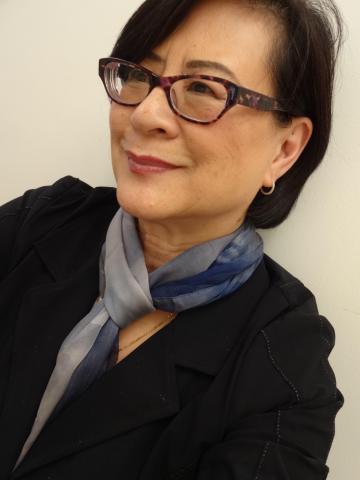
Mae Ngai
Lung Family Professor of Asian American Studies and Professor of History
Columbia University
Thursday, October 10
4:30 p.m.
Paino Lecture Hall
107 Beneski
Emma Lazarus called America the “mother of exiles” in her poem, “The New Colossus,” which graces the Statue of Liberty. This lecture examines the enduring idea of America as a land of hope and refuge for the persecuted and oppressed. It goes beyond the familiar narratives of the Puritan settlers and the Statue of Liberty to think about how the idea of asylum has historically justified and obscured nation-building and racial agendas. It will compare the politics surrounding cold war refugees from Europe, Cuba, and Asia, and consider the contemporary recasting of Central American asylum seekers as undocumented migrants.
Mae Ngai is the Lung Family Professor of Asian American Studies and a Professor of History at Columbia University. She is the author of the award-winning Impossible Subjects: Illegal Aliens and the Making of Modern America. (Columbia's full profile)
The annual Hugh Hawkins Lecture honors the late Hugh D. Hawkins. Professor Hawkins was the Anson D. Moore Professor of History and American Studies upon his retirement from the faculty in 2000, after forty-three years of teaching at Amherst. He was a distinguished scholar of American higher education, the American South, and of cultural and intellectual history. In 1976 he was the principal architect of the first-year Introduction to Liberal Studies curriculum, and he helped build both the History and American Studies Departments.
This lecture is free and open to the public.
Event Flier:
Ronald Suny
William H. Sewell Jr Distinguished University Professor of History at the University of Michigan Ann Arbor
October 16, 2019
4:30 p.m.
Amherst Center for Russian Culture (202 Webster Hall)
Ronald Suny is Professor Emeritus of Political Science and History at the University of Chicago, and Senior Researcher at the National Research University—Higher School of Economics in Saint Petersburg, Russia. is the author of The Baku Commune, 1917-1918: Class and Nationality in the Russian Revolution (Princeton University Press, 1972); Armenia in the Twentieth Century (Scholars Press, 1983); The Making of the Georgian Nation (Indiana University Press, 1988, 1994); Looking Toward Ararat: Armenia in Modern History (Indiana University Press, 1993); The Revenge of the Past: Nationalism, Revolution, and the Collapse of the Soviet Union (Stanford University Press, 1993); The Soviet Experiment: Russia, the USSR, and the Successor States (Oxford University Press, 1998, 2011); and “They Can Live in the Desert But Nowhere Else”: A History of the Armenian Genocide (Princeton University Press, 2015).
This lecture is sponsored by the Amherst College Lecture Committee, Amherst Center for Russian Culture, Georges Lurcy Lecture Series Fund, and Lamont Lecture Fund. A reception will follow.
Free and open to the public.
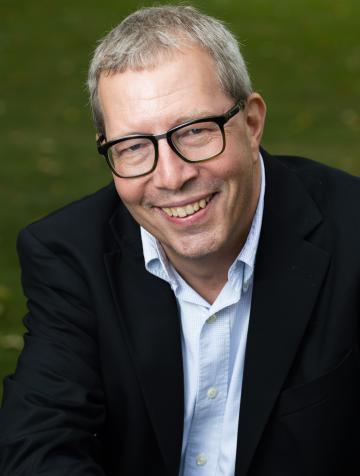
Peter Holquist
Ronald S. Lauder Endowed Term Associate Professor of History at the University of Pennsylvania
September 26, 2019
4:30 p.m.
Amherst Center for Russian Culture (202 Webster Hall)
This lecture is free and open to the public.

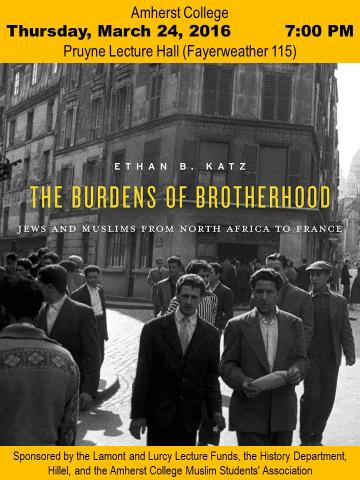
The Burdens of Brotherhood: Jews and Muslims from North Africa to France
Ethan B. Katz
Thursday, March 24th
7:00 p.m.
Pruyne Lecture Hall (Fayerweather 115)
Headlines from France suggest that Muslims have renewed an age-old struggle against Jews and that the two groups are once more inevitably at odds. But the past tells a different story. The Burdens of Brotherhood is a sweeping history of Jews and Muslims in France from World War I to the present. Here Ethan Katz introduces a richer and more complex world that offers fresh perspective for understanding the opportunities and challenges in France today.
Focusing on the experiences of ordinary people, Katz shows how Jewish-Muslim relations were shaped by everyday encounters and by perceptions of deeply rooted collective similarities or differences. We meet Jews and Muslims advocating common and divergent political visions, enjoying common culinary and musical traditions, and interacting on more intimate terms as neighbors, friends, enemies, and even lovers and family members. Drawing upon dozens of archives, newspapers, and interviews, Katz tackles controversial subjects like Muslim collaboration and resistance during World War II and the Holocaust, Jewish participation in French colonialism, the international impact of the Israeli-Arab conflict, and contemporary Muslim antisemitism in France.
We see how Jews and Muslims, as ethno-religious minorities, understood and related to one another through their respective relationships to the French state and society. Through their eyes, we see colonial France as a multiethnic, multireligious society more open to public displays of difference than its postcolonial successor. This book thus dramatically reconceives the meaning and history not only of Jewish-Muslim relations but ultimately of modern France itself.
Sponsored by the Lamont and Lurcy Lecture Funds, the History Department, Hillel, and the Amherst College Muslim Students' Association

"The Law in These Parts:" Screening and Interview with Israeli filmmaker Ra'anan Alexandrowicz
Wednesday, February 3rd
7:00 p.m.
Keefe Theater
Can a modern democracy impose a prolonged military occupation on another people while retaining its core democratic values? Since Israel conquered the territories of the West Bank and Gaza Strip in the 1967 war, the military has imposed thousands of orders and laws, established military courts, sentenced hundreds of thousands of Palestinians, enabled half a million Israeli "settlers" to move to the Occupied Territories and developed a system of long-term jurisdiction by an occupying army that is unique in the entire world.
The men entrusted with creating this new legal framework were the members of Israel's military legal corps. Responding to a constantly changing reality, these legal professionals have faced (and continue to face) complex judicial and moral dilemmas in order to develop and uphold a system of long-term military “rule by law” of an occupied population, all under the supervision of Israel's Supreme Court, and, according to Israel, in complete accordance with international law.
The Law in These Parts explores this unprecedented and little-known story through testimonies of the military legal professionals who were the architects of the system and helped run it in its formative years. The film attempts to ask some crucial questions that are often skirted or avoided: Can such an occupation be achieved within a legal framework that includes genuine adherence to the principles of rule-of-law? Should it? What are the costs that a society engaged in such a long term exercise must bear? And what are the implications of the very effort to make a documentary film about such a system?
Sponsored by the Lamont and Lurcy Lecture Funds, Hillel, & the departments of History and of Law, Jurisprudence, & Social Thought.
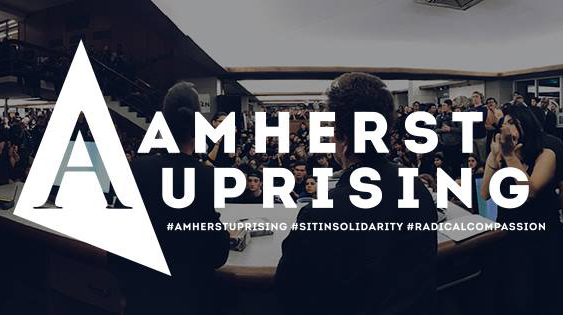
The Department of History supports the students in their quest for a more equitable and just society, and for the creation of a more inclusive community at the college. We have been moved, humbled, and inspired by the testimonies that students of color and their allies have shared in Frost Library over the past few days, and we take seriously their demands for addressing the various forms of structural racism, inequalities, and everyday forms of discrimination on our campus. We are committed to using our classrooms to engage with the broadest range of opinions and to better understand the entrenched problems of inequality in our society, which so often are the products of interwoven historical forces. We applaud our students for taking action on this important issue, and will continue to listen and learn as they shine a light on the struggles of marginalized people at Amherst, in the local community, and globally. This moment presents an opportunity to emerge as a more united community that values and reflects the diversity of experiences and perspectives within the Amherst College family.
Sincerely,
The Department of History
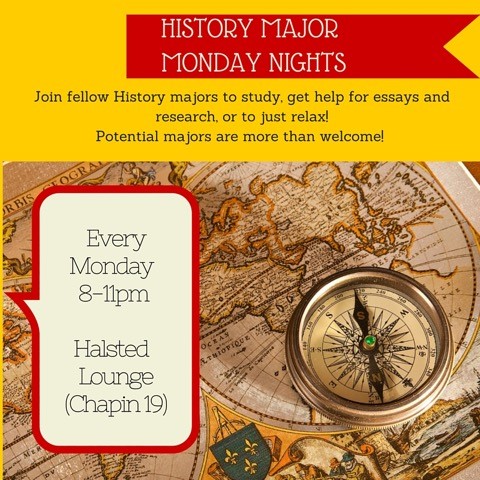

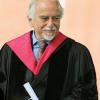
"Land, Law, and Lordship in Medieval France:
A Memorial Symposium for Fredric L. Cheyette"
Saturday, October 10th - 9:00 a.m. - 5:00 p.m.
Pruyne Lecture Hall - Fayerweather 115
A Celebration of the Life of Fredrick L. Cheyette (1932 - 2015)
Sunday, October 11th - 1:00 p.m.
Johnson Chapel
More details, including programs, for Symposium and Memorial Service.

(23 September 2015)

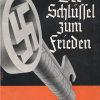
Tuesday, September 22, 2015 - 5:00 p.m.
Pruyne - 115 Fayerweather Hall
On Friday, September 11th, at 4 o'clock in the Religion Lounge (first floor of Chapin Hall), the History Department will hold its first majors' meeting of the year. All majors are invited. Come meet your fellow majors, have your questions answered about requirements, the Capstone project, and how to prepare for study abroad. Refreshments will be provided.
You will also elect 4 students (at least one senior) to represent your interests to the Department.